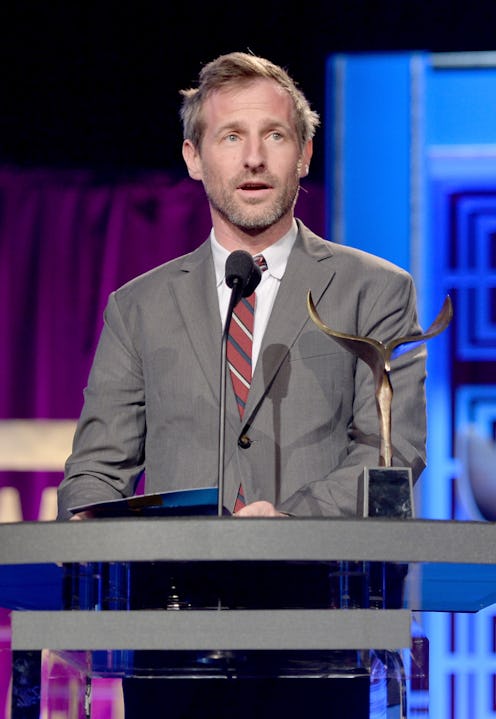Awards season can be a bit harrowing for any filmmaker. When Oscar shines a light on a film, detailed scrutiny is sure to follow and Her, which is nominated for Best Picture, Best Director, and Best Actor, is no different. As it turns out, director Spike Jonze has had it up to his oddly high belt loops. Jonze got snippy with reporter Emily Maitlis from BBC Newsnight (via Indiewire) when she boiled down the plot of Her into a nice, concise soundbite — and the one that almost anyone in need of a quick description of Her tends to turn to.
She calls the film a story about "falling in love with your software," and while anyone who's seen the movie knows the real story is much deeper than that, the quirky, futuristic premise is what's been at the forefront of the marketing of the film. It's the film's "huh" factor, and while Jonze may be tired of having his film chopped down to a reductive one-liner — especially when Maitlis seems to be obsessed with the technology element, rather than the emotional core of the film later in the interview — it is what gets the masses through the door to see his film.
Still, Jonze comes back at the reporter with a somewhat condescending question, "Have you seen the movie?" and follows it up with an inquiry about what she felt while watching the movie. She replies with a question that truly sets Jonze off, and while she's rather combative in her questioning, Maitlis isn't all that unjustified in one piece of her technology-obsessed reading of the film, "I was just curious as to whether the man has found his ideal woman who just works for him as his PA."
Naturally, this question offends Jonze, who just wanted to talk about the romance of Her, and while heightened emotion is truly the film's best accomplishment, Maitlis wasn't entirely off base with this particular question — I'm not touching her "will technology take over" question though.
(Her spoilers abound from this point on.) Her starts off as a funky film in which Joaquin Phoenix's character finds companionship from this perfect "woman" literally created to suit his every need — as an OS, she truly is his subservient assistant and he quickly falls for her. And as Jonze remarks in the interview, when the OS begins to assert independence and become a full person, conflict arises and the relationship plot thickens. He's right, and the movie does beautifully communicate the delicacies of human relationships through this seemingly inhuman medium, but Jonze comes across as a bit sensitive when he balks at the notion that the power balance of the initial romantic relationship is lopsided — something that's not all that uncommon in contemporary romantic relationships either. And despite all the film's emotional intricacies, the power balance does tilt toward the previously helpless Pheonix's Theodore.
For all his emotional depth, Theodore is still attracted, initially, to the ways in which Samantha (Scarlett Johansson) is at his beck and call and her joy over her continual new experiences, all of which are tied to him. He's been dumped by his wife and can't control the romantic aspects of his life: Samantha changes that. Most of their initial conversations are about Theodore; she asks what he did today, how he is, and how she just researched some topic he needs handy. She's fascinated with his life, she plans and smooths out his schedule, and when she eventually grows legs (so to speak) and finds her own corners of experience outside of him, it sends him into a panic. Even when Theodore meets with his ex-wife to sign the divorce papers, she comments on the fact that she couldn't be what he desperately wanted her to be. Theodore's selfish expectations of his partner are right there in the plot, however greatly he fights them. It's not entirely out of the question to wonder about the power play that comes into affect when this subtle love story is played out through the equivalent of a personal assistant, especially when it falls apart as Samantha seeks independence.
Of course, Samantha being an assistant is just the setting the same way her being an operating system is just the setting. Ultimately, the film does explore moments found in almost any relationship; the notion of two lovers eventually growing in different directions and idea that love is not something that fits neatly in a heart-shaped box are certainly not specific to gender dynamics — or even specific to romantic relationships as we learn when Amy Adams' character loses the OS she's befriended. But to suppose that the setting, which does make Samantha subservient to Theodore for most of their initial courtship, has no bearing as long as the film is "moving" is a bit short-sighted.
More likely than not, Jonze is not short-sighted but rather tired of seeing his film parodied by Jonah Hill and of answering goofy questions about whether or not you can have sex with your iPhone. As such, it's understandable that Maitlis — who later confessed on Twitter that she actually disliked Her — ruffled his feathers, but in the grand scheme, her power dynamics question wasn't all that uncalled for even if it did sting just a little.
